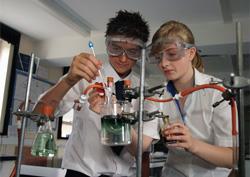Spending varies greatly between schools

New evidence shows that a worrying number of students are not experiencing a complete and authentic education in the sciences, due to a lack of resources for practical work.
Research commissioned by SCORE (Science Community Representing Education), a collaboration of leading science organisations, shows that on average, state-funded secondary schools and sixth form colleges have just 70% of the equipment and consumables that SCORE has identified as being essential to teach science subjects.
The research is published in two new reports on resourcing practical science, which were launched in London on 2 May. The data comes from a survey of teachers at primary and secondary schools and sixth form colleges.
Julia Buckingham, chair of SCORE, said: 'Taking part in practical work is an integral and essential part of learning the sciences, but our findings indicate that teachers do not feel equipped to give their students the full learning experience that they should be able to. Practical work is being limited by missing equipment and a lack of access to appropriate facilities such as laboratories and outside space.'
Secondary schools reported not having enough of some of the most commonly used equipment, such as microscopes, eye protection and connecting leads for circuits. The research also shows that many secondary schools lack essential support from qualified technicians to carry out practical work.
The reports reveal some particularly concerning data on the amounts that schools are spending on practical science, which varies greatly from school to school.
In state secondary schools the reported spend in 2011/12 varied from 75 pence per student up to £31.25, while in independent schools funding varied from £7.18 up to £83.21.
The reports show some further worrying statistics about science spending in schools:
- in state-funded secondary schools, an average of 28% of the practical science budget is spent on photocopying
- nearly 70% of secondary schools reported that staff had paid for items required for core curricular practical activities out of their own pockets, for which they were not always reimbursed
- 30% of maintained schools and 20% of academies expect to reduce science practical experiences due to future funding levels
Julia said: 'Given the increasing control schools have over their own budgets, some variation in spend between schools is probably to be expected. But the extent of the variation we have seen suggests a worrying inconsistency in the way funding is allocated both to and by schools, which will have a knock-on effect on the experiences of their students.
'The evidence shows that, in many schools, practical science is a low priority when it comes to allocating budgets. In secondary schools, nearly half of teachers feel that they don't have enough funding for practical work and in primary schools nearly a third of teachers feel the same.
'Low resourcing for practical work is a long-term problem and not one that is a simple matter of lack of government funding. Schools must share part of the responsibility for allocating funding for this important aspect of science learning.
'We need teachers to feel that they can make a strong case for practical science spend when school budgets are being decided. So to support them, SCORE has produced a set of benchmarks that provide common guidance on what levels of resourcing should be expected for practical science. These outline the quantities and specifications for equipment and facilities that we consider reasonable to enable teachers to provide engaging and inspirational lessons across the sciences.
'Practical work demonstrates the wonder of science so much more effectively than words on a page or pictures in a textbook. To inspire the next generation of scientists, we need to ensure that all pupils are exposed to the excitement and increased understanding of science that carrying out practical work
can bring.'
Launch tweets
@RSC_EiC tweeted live from the launch of the report:
- RT@SCORE_News: Teachers are regularly supplementing their school science budget from their own pockets
- Some secondary schools spend as little as 75p per head per year on science
- Curriculum change is a driving factor affecting funding for practical sci as schools can't plan effectively
- 29% of science budgets is spent on photocopying on average in state schools
- Some new-build school laboratories still not fit for purpose due to poor design eg electricity sockets not near to water
- 30% maintained schools and 20% of academies expect to reduce science prac experiences due to future funding levels
- 45% of science teachers 'satisfied' with resourcing levels
- 29% of schools have insufficient quantities of materials for chemistry practical work
- [Jim Iley] Science is incredibly important to the economy right now. Chem underpins 20% of GDP
- [Comment from the floor] Resources are important but quite often it is teachers that inspire people to be interested in science
- [Discussion panel] Teachers are professionals and know what is best needed in school
- [Panel] The technician team can make or break a department's ability to carry out meaningful practical work
Related Links
Download the reports and benchmarks from the SCORE website






No comments yet